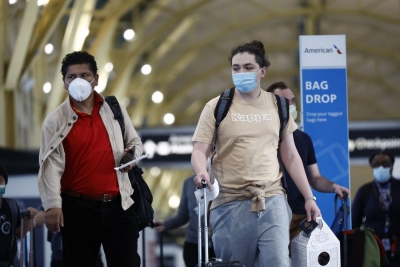Antonio Vitorino, director general of the International Organization for Migration (IOM), and Andrew Selee, president of the Migration Policy Institute (MPI), called for a path that balances health security with predictable cross-border movement, during an event on the sidelines of the International Migration Review Forum at the UN headquarters in New York, reports Xinhua news agency.
They warned that inaction would not only affect future migration, but also equitable pandemic recovery.
Governments and non-governmental partners attended the side event, which was organised by the IOM and MPI, together with the World Health Organization.
Despite dramatically different contexts for migration and mobility, participants agreed that there is a need to harmonize approaches, as well as build out the digital and physical infrastructure of border management and increase public funding for border crossings.
Both Vitorino and Selee expressed support for the creation of a member state-led group of friends focusing on cross-border mobility and pandemic preparedness.
A new pandemic treaty would complement and support the ongoing review of the International Health Regulations, which govern preparedness and response to health emergencies.
“Without this common endeavour, there is an increasing risk that future migration will become even more fragmented, accentuating the already evident signs of a two-speed recovery from Covid-19 that leaves less developed countries behind,” said Vitorino.
“This, in turn, will stall future economic and social development that could otherwise be accelerated through well-managed migration,” he added.
Selee noted that while there is an overall trend towards re-opening for travel, the process continues to be highly uneven, unequal, and uncoordinated.
“We lack common standards for requirements like testing, common tools to prove vaccination status across borders, and a common understanding of what works to manage public health risks at the border,” he said.
Antonio Vitorino, director general of the International Organization for Migration (IOM), and Andrew Selee, president of the Migration Policy Institute (MPI), called for a path that balances health security with predictable cross-border movement, during an event on the sidelines of the International Migration Review Forum at the UN headquarters in New York, reports Xinhua news agency.
They warned that inaction would not only affect future migration, but also equitable pandemic recovery.
Governments and non-governmental partners attended the side event, which was organised by the IOM and MPI, together with the World Health Organization.
Despite dramatically different contexts for migration and mobility, participants agreed that there is a need to harmonize approaches, as well as build out the digital and physical infrastructure of border management and increase public funding for border crossings.
Both Vitorino and Selee expressed support for the creation of a member state-led group of friends focusing on cross-border mobility and pandemic preparedness.
A new pandemic treaty would complement and support the ongoing review of the International Health Regulations, which govern preparedness and response to health emergencies.
“Without this common endeavour, there is an increasing risk that future migration will become even more fragmented, accentuating the already evident signs of a two-speed recovery from Covid-19 that leaves less developed countries behind,” said Vitorino.
“This, in turn, will stall future economic and social development that could otherwise be accelerated through well-managed migration,” he added.
Selee noted that while there is an overall trend towards re-opening for travel, the process continues to be highly uneven, unequal, and uncoordinated.
“We lack common standards for requirements like testing, common tools to prove vaccination status across borders, and a common understanding of what works to manage public health risks at the border,” he said.






































